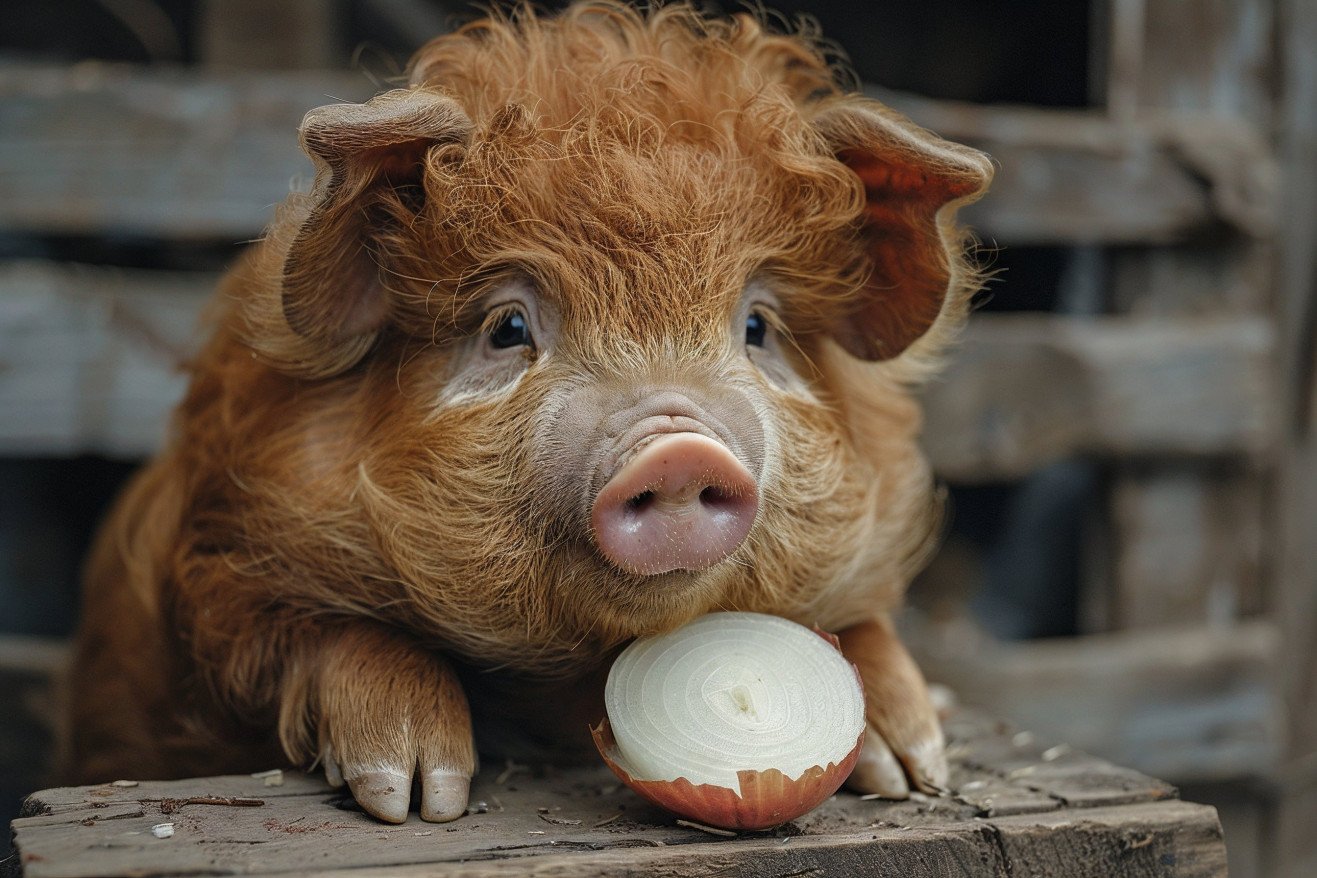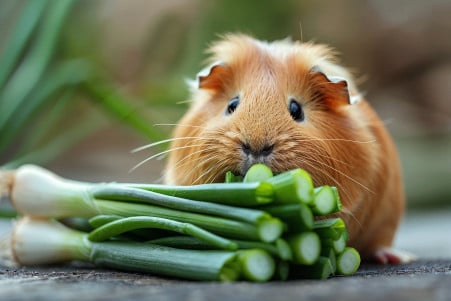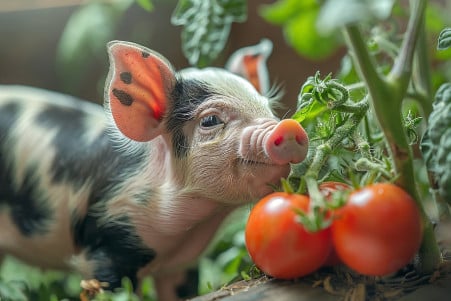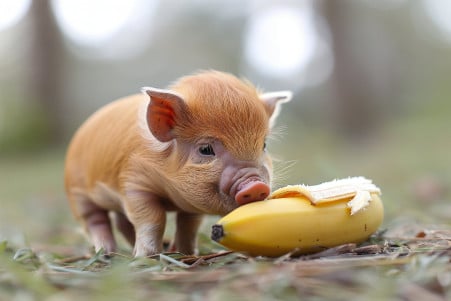Can Pigs Eat Onions? The Risks and Benefits Explained
16 May 2024 • Updated 15 May 2024

Although onions have some nutritional value for pigs, their potential toxicity means that they should be fed in moderation, if at all. Onions contain disulfides that can lead to the destruction of red blood cells and anemia in pigs, especially if they're consumed regularly in large amounts. It's best to err on the side of caution and avoid feeding onions to pigs or at least consult a veterinarian before doing so.
This article will cover the scientific evidence regarding the risks and consequences of feeding onions and other alliums to pigs. By reviewing research from veterinary medicine, animal nutrition, and toxicology, you'll learn about the compounds in alliums that are harmful to pigs, the amounts that are dangerous, and the best ways to feed alliums to pigs safely, if at all. This in-depth overview will help you make sure that your pigs are healthy while still enabling you to make good use of food waste.
Can pigs eat onions?
Toxic Chemicals in Onions and Their Impact on Pigs
Onions are rich in sulfur-containing disulfides, especially n-propyl disulfide, which can be toxic to pigs. The Merck Veterinary Manual explains that these chemicals cause oxidative damage to red blood cells, which can result in hemolytic anemia and methemoglobinemia.
The ASPCA lists vomiting, blue gums, difficulty breathing, and diarrhea as early signs of onion toxicity in pigs, while more advanced symptoms include lethargy, weakness, and death due to significant hemolysis (the destruction of red blood cells). Cats and dogs can also be poisoned by onions, but cats are the most sensitive species.
Pigs that have eaten too many onions are at risk of serious health problems due to the oxidative damage caused by disulfides. It's important to make sure they have access to safe foods to eat.
Healthy Alternatives: Nutritious Veggies and Pig Foods
Pigs can eat a variety of fresh vegetables as part of a balanced diet, including celery, cucumbers, peppers, carrots, potatoes, and leafy greens. As noted by 20+ low cost pig feed options to help grow tasty pork, pigs will "willingly gorge themselves on veggies" from the garden. Fruits like apples, melons, and plums can also be given to pigs in moderation as they are high in sugar.
Other pig-friendly foods include nuts, grains (barley, triticale), root vegetables (turnips, sweet potatoes), and certain plant-based meals (canola, sunflower) as listed in Alternative Feed sources for swine. Vegetable scraps and garden waste are great low-cost pig foods, but it's best to avoid onion skins or any other onion waste. Pigs can also eat nuts like pecans and acorns and graze on grasses and other plants.
Owners can ensure their pigs' health and happiness while avoiding the potential dangers of onions by making sure their pigs have a well-rounded diet that includes a variety of safe and healthy foods.
Risk Mitigation: Best Practices for Feeding Onions to Pigs
If you decide to feed onions to pigs, it is important to limit the amount and frequency of onion consumption. According to New Life On A Homestead, onions should be fed to pigs sparingly, no more than once or twice a week, and in small quantities. Cooking onions can help reduce the levels of disulfides, which are toxic to pigs, so cooked onions are safer. However, JustAnswer warns that even cooked onions can cause gastrointestinal upset in pigs. Owners should also avoid feeding pigs dehydrated or powdered onions, which are more concentrated and therefore more toxic.
It is also important to watch pigs carefully for signs of toxicity or distress after they have eaten onions, and if any signs are observed, feeding should be stopped immediately. This is also true for pigs that are being raised for slaughter, as Lifestyle Block points out that onions can affect the taste of the meat.
By following these guidelines, the risks of feeding onions to pigs can be minimized, but as always, a slow introduction of any new food is best.
Transitioning Pigs to New Foods: Take It Slow
Whenever you're adding new foods or ingredients to a pig's diet, it's important to make the changes slowly so the pig's digestive system can adapt. As Pork Business explains, "Transitioning the weaned pig is the most critical step. We have to work with the pig and recognize what physically the animal is able to digest and absorb and not rush the process."
This is where a complex, easily digestible diet can help make the transition easier, especially for young pigs or pigs that have recently been weaned. According to Star Milling Co., "Complex diets are easy to digest and support a gradual transition from liquid milk to dry ingredients." This allows the piglet's digestive system to mature and develop.
Lactose and dried distillers grains are two examples of ingredients that should be introduced gradually to avoid problems like reduced feed intake, ulcers, and poor growth, as reported by the Journal of Animal Science. It's also important to make sure pigs have access to fresh, clean water during dietary changes so they can stay properly hydrated and support their digestive system.
It's also important to keep a close eye on pigs for any signs of digestive issues or other problems when you're changing their diet. This will help ensure a successful and safe transition.
Onion Toxicity in Pigs: Signs and Treatment
According to the ASPCA, early signs of onion toxicity in pigs include vomiting, diarrhea, blue-tinged gums, and labored breathing. As the poisoning progresses, pigs may also show signs of weakness, depression, and anemia as a result of red blood cell destruction.
If onion toxicity is suspected, it's important to remove the source and provide supportive care, including fluids and oxygen. According to the Merck Veterinary Manual, in more severe cases, a vet may also recommend blood transfusions or other treatments to help manage the hemolytic anemia.
This is because, as the Clinicians Brief article on hematology and onion toxicity explains, if onion toxicity is left untreated, it can result in organ failure and death in pigs. Therefore, it's important to make sure that you know the signs of onion toxicity and seek veterinary care as soon as possible to avoid the worst outcomes of onion toxicity in pigs.
Conclusion: How to Safely Incorporate Onions Into a Pig's Diet
While onions can provide some nutritional value for pigs, their potential toxicity means they should be approached with caution and moderation. Feeding large amounts of onions or concentrated forms like dehydrated onions can lead to serious health issues, including hemolytic anemia and organ damage.
By understanding the risks associated with onion consumption and following best practices for safe feeding, pig owners can minimize potential harm. Prioritizing a balanced diet with a variety of safe, nutritious vegetables, fruits, grains, and forages is recommended for optimal pig health and growth. Consulting with a veterinarian or animal nutritionist can provide personalized guidance on appropriate feeding strategies for individual pigs or herds.


